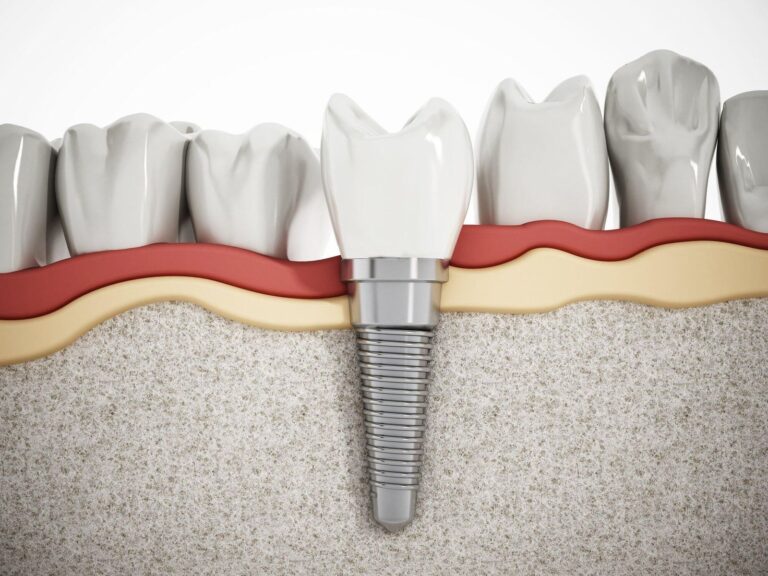Common Concerns and Misconceptions About Front Dental Implants
Front dental implants have become popular solution in cosmetic dentistry. It has been great for those looking to achieve perfect teeth and a healthy and beautiful smile.
However, many dental patients still harbor concerns and misconceptions about these implants. So below, we will debunk some of the most common myths. We’ll also provide clear, factual information to help you make an informed decision.
Let’s dive in!
Front Implants Are Only for Cosmetic Purposes
This is perhaps the biggest myth of all. Front dental implants do enhance your smile. However, they serve a much bigger purpose than just aesthetics. In fact, these implants can greatly improve your oral health and functionality.
When you have missing teeth, it can affect your ability to properly chew and digest food. It can also lead to bone loss in the jaw. It can cause changes in facial structure and potentially leading to further tooth loss.
Front implants not only fill in the gaps left by missing teeth. They also stimulate the growth of new bone cells in the jaw for better stability.
The Procedure Is Painful and Invasive
Many people avoid getting front implants because they fear the procedure will be painful and invasive. This is simply not true.
With modern technology, the process of getting dental implants is relatively quick and painless. The area is numbed with local anesthesia to minimize discomfort during the procedure.
Some patients may experience slight soreness or swelling afterwards. However, this can easily be managed with over-the-counter pain medication.
The implant itself is a small titanium post that is placed into the jawbone. Over time, it fuses with the bone to become a sturdy foundation for an artificial tooth or crown.
Implants Look Unnatural
Another common myth is that front dental implants look fake or unnatural. This may have been true in the past. However, modern advancements in technology and materials have made it possible to create incredibly realistic-looking implants.
Dental professionals like this dentist in Miami Gardens use specially designed crowns and bridges. They can match the shape, size, and color of your natural teeth. They are also carefully placed to ensure they blend seamlessly with your existing teeth for a natural appearance.
Nobody will be able to tell the difference between your implant and natural teeth. They will simply see a beautiful, healthy smile.
Implants Require Special Care
Some people may believe that front implants require extra care and maintenance. This is not the case.
Once your implant has healed, you can care for it just like your natural teeth. Simply brush twice a day, floss daily, and visit your dentist regularly for cleanings and check-ups.
There are no special tools or techniques needed to keep your implant in good condition. Just following proper oral hygiene habits will ensure its longevity.
For example, you don’t need a special toothbrush or floss for your implant. However, using a soft-bristled toothbrush and non-abrasive toothpaste can help prevent scratching the surface of the implant.
You also don’t need to buy special cleaning products for your implant. Regular toothpaste and mouthwash are sufficient.
The Cost Is Prohibitive
One of the biggest concerns for many people is the cost of front dental implants. While it may seem expensive upfront, it is actually a long-term investment. It is good for your oral health and overall well-being.
Compared to other tooth replacement options implants have a higher success rate and longer lifespan. This means you will likely save money in the long run. You won’t have to continuously replace these temporary solutions.
Additionally, some dental insurance plans may cover a portion of the cost of dental implants. It’s always worth checking with your provider to see what is covered.
Just compare it to the cost of potential future complications from not replacing a missing tooth, such as bone loss and shifting teeth. The extra cost now could save you from more expensive treatments in the future.
Implants Are Not Suitable for Older Adults
Another myth is that front dental implants are not suitable for older adults. However, age does not necessarily determine eligibility for dental implants.
As long as you have healthy gums and sufficient bone structure in your jaw to support the implant, age should not be a limiting factor. In fact, many older adults use dental implants as a long-term solution for missing teeth.
Consult with your dentist to see if you are a good candidate for dental implants. They will thoroughly evaluate your oral health. They will provide recommendations based on your individual needs.
The Healing Process Takes Too Long
Some people may avoid getting dental implants because they believe the healing process takes too long. It is true that dental implants require a healing period before the final crown or bridge can be placed. However, this time frame is relatively short.
Generally, it takes about 3-6 months for an implant to fully fuse with the bone and become stable enough for a restoration. However, most patients experience minimal discomfort during this time. They are still able to resume their normal daily activities.
In comparison to other tooth replacement options such as dentures or bridges front dental implants offer a more permanent and stable solution. It may require a little patience, but the long-term benefits make it worth the wait.
Implants Can Cause Allergic Reactions
There have been concerns about allergies to titanium in dental implants. However, studies have shown that it is a highly biocompatible material. This means that the body rarely rejects or has an allergic reaction to it.
In rare cases where patients do have a sensitivity to titanium, alternative materials such as ceramic can be used for the implant post. Other materials used for the crown or bridge, such as porcelain, are also highly biocompatible.
In any case, your dentist will thoroughly discuss any potential allergies with you. They will make sure to address any concerns before moving forward with the implant procedure.
Implants Are Not as Strong as Natural Teeth
Dental implants are not exactly the same as natural teeth. However, they can still provide a strong and durable replacement. In fact, with proper care and maintenance, implants can last for decades.
Implants are made from strong materials such as titanium or ceramic. They are designed to withstand biting and chewing forces similar to natural teeth.
They also help prevent bone loss in the jaw which can weaken neighboring teeth over time. This makes them a long-term solution for missing teeth that promotes overall oral health.
The Procedure Has a Low Success Rate
Some people may believe that dental implant procedures have a low success rate. However, with modern technology and proper care, the success rate for implants is actually very high.
In fact, reputable dentists have a success rate of over 98% for dental implants. This means that the risk of complications or failure during or after the procedure is extremely low.
Of course, it’s important to choose an experienced and qualified dentist who uses high-quality materials and follows proper techniques. This will ensure the best chance for successful results.
Implants Can Move or Fall Out
Another common myth is that dental implants can move or fall out. This simply isn’t true.
Once an implant has fully fused with the jawbone, it becomes a permanent part of your mouth. It will not shift or move like dentures may do.
Dental implants are placed strategically to provide maximum stability and support for artificial teeth. They are also regularly checked by your dentist during routine exams to ensure they remain in place.
Just make sure to follow proper oral hygiene habits. You should also avoid damaging activities such as chewing on hard objects. This will help maintain the integrity of your dental implant and prevent any potential issues.
Only One Type of Implant Is Available
Some people may believe that there is only one type of dental implant available. However, there are different types and sizes of implants to accommodate various needs:
Endosteal Implants
This is the most common type of dental implant. It is a small titanium post that is surgically placed into the jawbone. After healing, a custom-made crown or bridge is attached to the implant.
They are suitable for patients with enough healthy bone in the jaw to support the implant. And they offer a stable, long-term solution for missing teeth.
Subperiosteal Implants
For patients with insufficient bone density in their jaw for traditional implants, subperiosteal implants may be an option. These implants are placed on top of the jawbone and under the gum line.
They are held in place by a metal framework that is attached to the jawbone. Artificial teeth can then be attached to the posts of the implant.
Mini Dental Implants
As a less invasive option, mini dental implants are smaller versions of endosteal implants. They can often be placed without needing to cut into the gum tissue. They are most commonly used for dentures or bridges in cases of missing multiple teeth.
They are also suitable for patients with limited bone density in the jaw. And they require less healing time compared to traditional implants.
Implants Interfere With Eating and Speaking
Some people may believe that front dental implants can interfere with everyday activities such as eating and speaking. This is not true.
Once the implant has fully healed and a crown or bridge is attached, it functions just like a natural tooth. You can eat, speak, and smile without any issues or limitations.
Dental implants also prevent speech difficulties. You can avoid anything that may occur with other tooth replacement options like dentures.
The Procedure Is Not Safe for Pregnant Women
There is a myth that pregnant women should avoid dental implant procedures. However, this is not true.
Dental implants are safe and can be placed during pregnancy with proper precautions. Your dentist will monitor your condition. They will also consult with your obstetrician before proceeding with any procedure.
Implants Can Cause Infections
Another misconception is that dental implants can cause infections. While any medical procedure carries a slight risk of infection, proper care and hygiene practices can greatly reduce this risk.
Your dentist will also provide you with detailed aftercare instructions to ensure your implant heals properly. They may also prescribe antibiotics to prevent potential infections during the healing process.
In general, dental implants have a very low rate of complications or infections. As long as you follow your dentist’s recommended guidelines, your chances of experiencing any issues are minimal.
The Process Is Too Lengthy
Some people may avoid getting dental implants because they believe the process is too lengthy. Yes, it does require a few months for the implant to fully integrate and heal. However, this is still a relatively short amount of time in comparison to other tooth replacement options.
Additionally, your dentist can often place temporary restorations during the healing period. This means that you can have a functional and aesthetically pleasing smile. At the same time, you wait for your permanent restoration.
The process may also involve multiple stages. However, each one is important for ensuring the success and longevity of your implant. It’s worth taking the extra time to achieve a beautiful and healthy smile that will last for years to come.
Implants Are Only for Front Teeth
While front dental implants are commonly used for missing teeth in the front of the mouth, they can also be used for back teeth.
Back teeth play an important role in chewing and maintaining proper jaw alignment. Replacing missing back teeth with implants can prevent future oral health issues such as shifting or overcrowding of other teeth.
If you have a missing tooth anywhere in your mouth, consult with your dentist to see if a dental implant is a suitable option. They will assess your individual case and provide recommendations based on your specific needs.
Front Dental Implants Are a Worthwhile Investment
Front dental implants are a worthwhile investment for those looking to replace missing teeth. They offer a long-term solution that is both aesthetically pleasing and functional. With proper care and maintenance, they can last for decades without the need for replacement.
So don’t let myths or misconceptions hold you back from achieving a healthy and confident smile. Consult with your dentist to see if front dental implants are the right option for you.
Did you find this article helpful? If so, check out the rest of our site for more.







